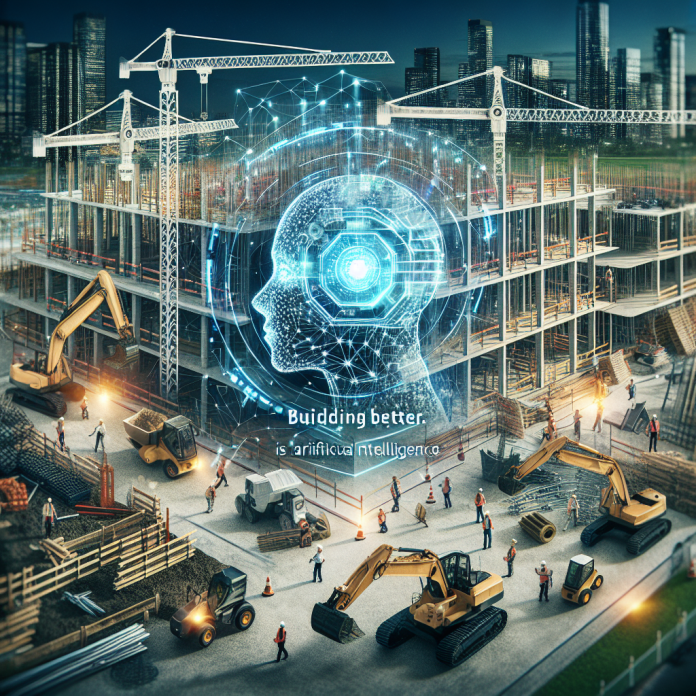Artificial Intelligence (AI) is no longer a futuristic concept or sci-fi fantasy; it is increasingly becoming a part of our daily lives, transforming industries, businesses, and even the way we interact with technology. As we stand at the brink of a new era, it is crucial to understand the impact AI is having on our world and how we can harness its power to construct a better future.
**The Rise of AI**
In recent years, AI has made significant strides in various fields, from healthcare and finance to entertainment and transportation. Companies like Google, Amazon, and Microsoft are investing heavily in AI research and development, leading to breakthrough technologies that promise to revolutionize the way we live and work.
One of the key drivers of AI’s rapid growth is its ability to analyze massive amounts of data with speed and precision, enabling organizations to make data-driven decisions and automate tasks that were previously performed by humans. This has led to increased efficiency, productivity, and innovation across industries, creating new opportunities for growth and development.
**Building a Smarter Future**
As AI continues to mature, its impact on society is becoming more profound. From self-driving cars and virtual assistants to predictive analytics and personalized medicine, AI is reshaping our world in ways we never thought possible. By leveraging the power of AI, businesses can gain a competitive edge, improve customer experiences, and drive digital transformation at an unprecedented pace.
For example, companies like Netflix and Spotify are using AI algorithms to recommend personalized content to users based on their preferences and behavior. This not only enhances user engagement but also helps these companies to understand their customers better and tailor their offerings to meet their needs.
Similarly, healthcare providers are using AI-powered tools to analyze medical images, predict disease outcomes, and personalize treatment plans for patients. This has the potential to revolutionize healthcare by improving diagnosis accuracy, reducing treatment costs, and ultimately saving lives.
**Challenges and Opportunities**
While the potential of AI is immense, it also presents challenges that must be addressed to ensure its responsible and ethical use. Issues like bias in algorithms, data privacy concerns, and job displacement due to automation are real threats that need to be addressed proactively.
For instance, AI algorithms have been found to exhibit bias against certain groups based on race, gender, or socio-economic status, leading to discriminatory outcomes in areas like hiring, lending, and criminal justice. To mitigate this, companies and policymakers need to ensure transparency, fairness, and accountability in AI systems to prevent harm and promote equity.
On the other hand, AI also presents opportunities to address some of the most pressing challenges facing society, such as climate change, healthcare disparities, and social inequality. By leveraging AI technologies like predictive modeling, optimization algorithms, and natural language processing, we can devise innovative solutions to complex problems and create a more sustainable and equitable future for all.
**Empowering Human Creativity**
Despite the fears of AI replacing human jobs and skills, many experts believe that AI will augment human capabilities rather than replace them entirely. By automating routine tasks, AI frees up human talent to focus on more creative and strategic endeavors that require empathy, critical thinking, and problem-solving skills.
For example, artists and designers are using AI tools to create new forms of art, music, and literature that push the boundaries of human creativity. By collaborating with AI algorithms, they can explore new ideas, experiment with different styles, and unlock hidden patterns in data that inspire innovative works of art.
Moreover, AI can help individuals learn new skills, discover new interests, and connect with like-minded communities through personalized recommendations, adaptive learning platforms, and virtual mentorship programs. This democratization of knowledge and expertise empowers individuals to pursue their passions, fulfill their potential, and contribute meaningfully to society.
**A Call to Action**
As we navigate the uncharted territory of AI-driven innovation and disruption, it is essential for individuals, organizations, and policymakers to collaborate and co-create a future that is human-centered, ethical, and sustainable. By fostering a culture of responsible AI adoption, we can unlock the full potential of this transformative technology and pave the way for a brighter tomorrow.
In conclusion, AI has the power to shape the future in ways we cannot yet imagine, but it is up to us to ensure that this future is built on a foundation of compassion, creativity, and collaboration. By harnessing the power of AI to enhance our lives, expand our horizons, and empower our communities, we can construct a future that is inclusive, innovative, and inspired by our collective humanity. Let us embrace the possibilities of AI with open minds and open hearts, and together, we can build a brighter tomorrow for all.

